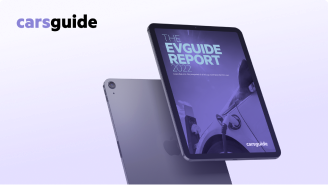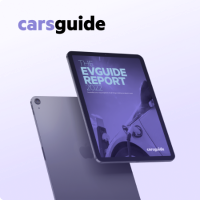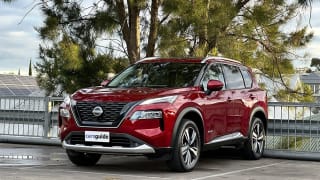
BMW electric cars in Australia: Everything you need to know
- BMW 3 Series
- BMW 7 Series
- BMW 5 Series
- BMW 530e
- BMW 330e
- BMW 745e
- BMW i Series
- BMW X Models
- BMW X5
- BMW i4
- BMW IX
- BMW iX3
- BMW 3 Series 2021
- BMW 5 Series 2021
- BMW 7 Series 2021
- BMW i Series 2021
- BMW X Models 2021
- BMW 530E 2021
- BMW X5 2021
- BMW 330e 2021
- BMW 745E 2021
- BMW IX3 2021
- BMW Coupe Range
- BMW Hatchback Range
- BMW Sedan Range
- BMW SUV Range
- Coupe
- Hatchback
- Sedan
- SUV
- Electric Cars
- Hybrid Cars
- BMW 3 Series Reviews
- BMW 7 Series Reviews
- BMW 5 Series Reviews
- BMW 530e Reviews
- BMW 330e Reviews
- BMW 745e Reviews
- BMW i Series Reviews
- BMW X Models Reviews
- BMW X5 Reviews
- BMW i4 Reviews
- BMW IX Reviews
- BMW iX3 Reviews
- BMW
- EV Advice
- BMW Advice
- EV
- Electric Cars
- Electric
- Green Cars
- EVs
- Prestige & Luxury Cars
- Hybrid
- Plug-in hybrid
- Hybrid cars

Tesla might carry on like electric vehicles never even existed before it came on the scene like an environmental saviour in a very shiny, futuristic suit, but was it experimenting with all-electric cars about 50 years ago?
No, it was not (although don’t put it past Elon Musk to invent a time machine to go back and rewrite history somehow).
BMW, however, was dabbling in EVs when Musk was still in nappies. The German motoring giant had its BMW electric car, the excellently named 1602 Elektro, acting as a support vehicle for the long-distance walkers and marathon runners competing at the 1972 Summer Olympic Games in Munich. The Elektro was carrying a film crew and supplying water while showing off its impressive (for the time, obviously) range of 30km (so, not for the whole marathon, obviously).
Read more about BMW's electric cars
- BMW doubles down on 2022 i4 and iX sustainability promise in similar move to Polestar, but admits it will ultimately add to the price for EV buyers
- 2022 BMW iX pricing and specs detailed: New Tesla Model X, Audi e-tron and Jaguar I-Pace rival emerges with long range and huge power
- 2022 BMW i4 detailed for Australia: German Tesla Model 3 and Polestar 2-rivalling electric bruiser to land with big range and performance
Fast-forward several decades and BMW had launched the mysterious sounding “Project i” to develop lightweight, eco-friendly, urban, fully electric BMW car concepts for people living in megacities.
That led to BMW announcing BMW i in 2011, a sub-brand created to design and manufacture EVs and Plug-In Hybrid Electric Vehicles (PHEVs).
The first two cars unveiled under the BMW i badge were 2013’s BMW i3 (we prefer the car’s original name, the very Judge Dredd-sounding Mega City Vehicle), and 2014’s BMW i8 PHEV super car (although the first PHEV BMW developed came in 2010 in the form of the BMW ActiveHybrid 7 concept).


Download the EVGuide Report, 2022
Australia's one-stop snapshot of all things relating to electric cars.
In 2016, BMW decided to label any of its vehicles with PHEV technology using the “iPerformance” model designation, including the 320e/330e iPerformance, 520e/530e/545e iPerformance, and 745e/745Le iPerformance.
All BMW EV models come with “eDrive” technology, which consists of three components: an electric motor, a lithium-ion high-performance battery and an intelligent energy-management system that ensures the vehicle is running as efficiently as possible.
BMW EVs available in Australia
The list of all currently available fully electric vehicles sold by BMW in Australia under its i-series sub-brand.
BMW i4

Price: From $99,900
BMW will attempt to give the Tesla Model 3 a run for its money with the i4, the brand’s first-ever fully-electric Gran Coupé, which is set to land in Australia in the first quarter of 2022. The i4 will come in two variants: the BMW i4 eDrive40 and the BMW i4 M50. The former comes with an impressive range of 590km (a figure not far off the Tesla Model 3 Long Range’s 614km claim), while the rather sporty latter comes with a claimed 510km of range and the ability to hot-step it from zero to 100km/h in a spry 3.9 seconds.
BMW iX

Price: From $135,900
BWW’s first all-electric SUV arrived in Australia late-2021, coming in two variants: xDrive40 (240kW of power, 630Nm of torque and 425km of range) and the xDrive50 (385kW of power, 765Nm of torque and 630km of range). Those who don’t fancy waiting around while their car charges will be pleased to know both models are compatible with DC fast charging at a rate of up to 150kW in the xDrive40, or 200kW in the xDrive50. A full-fat performance version, the iX M60 is due to join the range later.
BMW iX3

Price: From $114,900
The iX3 is simply a fully electric version of the popular X3 mid-size SUV, but packs a 210kW/400Nm electric motor on the rear axle and a 74kWh lithium-ion battery for an all-electric range of 460km.
BMW hybrids available in Australia

BMW already has a range of hybrids available in Australia, including the BMW 330e Sedan PHEV, BMW 530e PHEV, BMW 745e PHEV, BMW X3 xDrive30e PHEV, and the BMW X5 xDrive45e PHEV.
The future of BMW EVs
Having contracted China's Contemporary Amperex Technology (CATL) and Korea's Samsung SDI in 2019 to deliver lithium-ion cells for a hefty $10 billion over a decade, BMW has made its intentions clear in terms of commitment to the further development of EVs bearing the BMW badge.
BMW design chief Domagoj Dukec has publicly stated that BMW i models are becoming the most relevant part of the BMW brand, especially in markets like China where there has been a huge uptake in EVs. The brand has confirmed its all-electric lineup will be bolstered in the coming years with the i7 limousine and iX1 small SUV, as well as the potential re-introduction of the i3 as an electric version of the storied 3 Series sedan.

Driverless technology is also in BMW’s sights with the self-driving iNext concept, a fully electric SUV that BMW hopes will become the basis for fleets of fully autonomous vehicles for highway use, as well as “Robo-Taxis” in cities we’ll assume are policed by RoboCops.
BMW is also looking into hydrogen-powered vehicles with the BMW i Hydrogen Next SUV, a hydrogen fuel cell-powered concept (BMW has also been testing fuel-cell tech in a road test fleet of 5 series GTs).
BMW has also said it plans for half of its total sales to be fully electric by 2030, while also stating it expects to have delivered about 2 million BMW full-electric vehicles to customers by 2025, with that figuring leaping to a sizeable 10 million by 2030, making up at least half of its total global deliveries by that stage.











Comments